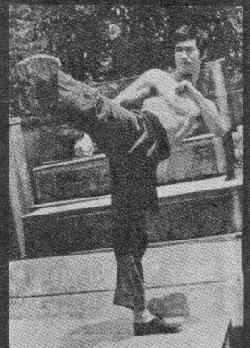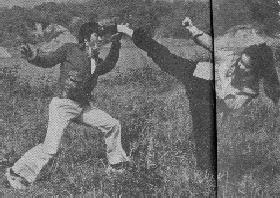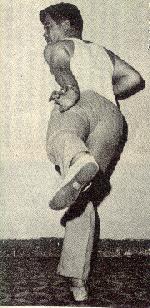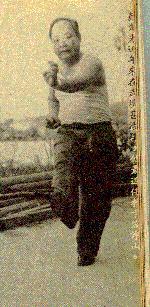April 2002 (Part 3)
SELECTION OF QUESTIONS AND ANSWERS

A typical kick demonstrated by the celebrated Bruce Lee
Question 1
I am just reading Mr.Wong's book on Zen and just came across a quote of Hui Neng about Zen which seems to be explained misleadingly, or at least it appears to me to be very fruitful to read the concerned sentence the other way around.
On page 109, Hui Neng is quoted with the sentence: “In your own nature and mind, use prajna to introspect and reflect.” On page 110, Mr. Wong explains: “The master explains that when sitting in meditation, you should let the mind introspect and reflect upon the higher wisdom that cosmic reality is tranquil and undifferentiated.”
Would it not be more appropriate to reverse the sentence, i.e. “The master explains that when sitting in meditation, you should let the higher wisdom (the cosmic reality that is tranquil and undifferentiated) introspect and reflect upon the mind (the phenomenal, partial, differentiated, etc.)”?
— Koenig, Germany
Answer
To enable readers to understand Hui Neng's teaching more clearly, let us simplify, without changing the meaning, the two versions as follows. My version is to let the meditator's mind reflects on cosmic reality. Your version is to let cosmic reality reflects on the meditator's mind.
The first version is correct. It is a process from the phenomenal (the meditator's mind) to the transcendental (cosmic reality). This is the aim of Zen cultivation.
The second version is incorrect. It is a process from the transcendental (cosmic reality) to the phenomenal (meditator's mind). This is the result of ignorance.
You have not understood what cosmic reality means, otherwise you would not have suggested using cosmic reality to introspect and reflect upon the mind. Once you did that, cosmic reality would disappear and phenomena would appear. This is what Lao Tzu means when he says that the Tao that can be called the Tao is not the Tao.
At first there is cosmic reality, which is tranquil and undifferentiated. In Zen jargon, this is your original face, the face before you were born, before your father and mother were born, before the sun, the moon and the universe were born.
Because of ignorance, cosmic reality is transformed by various conditions, such as the “six entries” of eyes, ear, nose, tongue, mouth and will, into phenomenal worlds, which are partial and differentiated. The aim of Zen cultivation is to look at your original face, to return from the phenomenal to the transcendental.
Question 2
When applying this reversed version, I can well imagine a clarifying effect. In the first version, one seems to make an effort from the perspective of the mind to get in touch with something higher, but the perspective would still be from the mind, and as I see it, the aim is to change the perspective from the phenomenal to the transcendental, is it not?
Answer
Yes, this is correct. Zen cultivation is to make concerted, dedicated effort “from the perspective of the mind to get in touch with” not just “something higher” but the ultimate.
The perspective has to be from the mind, because you are the mind. The prospective is not from cosmic reality, as you imply. Cosmic reality is the Buddha, or God. The aim of Zen meditation is to become the Buddha, or to be united with God.
Yes, “the aim is to change the perspective from the phenomenal to the transcendental.” When an ordinary person attains this, he hecomes a Buddha. When a Buddha changes his perspective from the transcendental to the phenomenal, he becomes an ordinary person.
In Zen terms, bodhi is samsara, and samsara is bodhi. It depends on your mind's perspective. A Buddha exists in bodhi, an ordinary person exists in samsara. If you go from the transcendental to the phenomenal, as you imply, you go from bodhi to samsara.
When an ordinary person becomes a Buddha, he goes from samsara to bodhi. But actually he does not change his physical location. The change is mental; it is a transformation of perspective from experiencing reality phenomenally to experiencing reality transcendentally.
A very rough analogy is a transformation of a scientist's perspective from seeing reality with his naked eyes as partial and differentiated entities like houses and people to seeing the same reality through a super-gigantic electronic microscope as a continuous spread of sub-atomic particles. A Zen cultivator, as taught by Hui Neng, does not use a super electronic microscope, he uses his mind to reflect on cosmic reality.

Bruce Lee's influence has been very wide-spread in martial arts. This picture taken from a kungfu movie at the time when Bruce Lee's films were very popular, shows a heroine executing a typical Bruce Lee's kick on a villain.
Question 3
Since we already possess that higher perspective in potential when we have “good roots”, would it not be more direct to use it rather than to crave for it?
Answer
You are confused between actual and potential, and between aspiring and craving. We have the potential to actualize cosmic reality, but we have not actualize it yet. When we have actualized cosmic reality, we become Buddhas, not ordinary persons.
From another perspective, we were originally Buddhas, but due to ignorance we were transformed from impartial, undifferentiated cosmic reality into partial, differentiated phenomena. The aim of Zen cultivation is to return to the original state, to transform our mental perspective from the phenomenal to the transcendental.
This is the most noble aspiration, calling for great courage and sacrifice. A Zen monk, for example, has to forego family life and all worldly pleasures. It is certainly not a craving.
Question 4
I am a fan of the Ultimate Fighting Championship (UFC) which is shown in US and starting to become very popular among martial arts fans. This is a freestyle martial arts competition where people from different martial arts background can come together and compete. I noticed that none of the martial arts champions were from Kung Fu background. If Shaolin Kung Fu is the best, how come so few with Kung Fu background make it to the finals? Maybe, some genuine Kung Fu masters from Asia should make it a point to compete in the UFC.
— Ricky, Malaysia
Answer
There are three main reasons why very few kungfu practitioners take part in the Ultimate Fighting Championship. First, although many people practice kungfu or wushu, a very great majority of them do not spar. They cannot even defend themselves effectively against karate or taekwondo brown-belt; they would not take part in the Ultimate Fighting Championship as they know very well they would be seriously injured if they do so.
Secondly, some kungfu practitioners can spar, but they usually use karate, taekwondo, kickboxing or other martial art techniques when they spar. Some of them might have taken part in the Ultimate Fighting Championship but they would be beaten in the early rounds. The majority would not take part because they know they stand little chance.
The third reason is as follows. Kungfu practitioners who have a good chance to reach the finals in the Ultimate Fighting Championship are genuine kungfu masters, and they form a very small minority of the kungfu population. These kungfu masters would not like to take part for two main reasons. They know that many who take part in the Ultimate Fighting Championship are formidable, professional fighters. Even if the kungfu masters could reach the finals, they would have sustained much injury on the way. The kungfu masters do not want to put themselves to such risk.
Moreover, fighting for price money in public would be against their philosophy. The training in genuine kungfu is that the more combat efficient you have become, the less you would want to fight. This is difficult for many people to understand or appreciate this philosophy. Many would think, not unreasonably, that the kungfu masters actually could not fight, and this is only an excuse to save face. I can only say that it is not an excuse, it is a real reason.
Personally I know some genuine kungfu masters who are deadly efficient in fighting, but they would walk away under provocation, sometimes even in apparently humiliating conditions. This actually make them and kungfu great.
I would briefly explain this seemingly odd philosophy and behavior. Great kungfu is not just a fighting art, but also a process of spiritual development. Someone who has attained a high level of genuine kungfu would also have attained a high level of spiritual development. Fighting for fame or money, or to prove to others that his kungfu is superior is not in line with such spiritual development.
This philosophy and corresponding behavior are not completely altruistic. Genuine kungfu training also makes a person wise. A genuine kungfu master realizes that to win in the Ultimate Fighting Championship against deadly opponents, he might have to be drastic.
For example, when a formidable opponent rushes in to grab his legs to throw him onto the ground, followed by a deadly lock, as often shown in Ultimate Fighting Championship, the kungfu master might have to smash his palm or drive his fist into the opponent's head to prevent his own defeat, which would be inevitable had the opponent be successful in grabbing his legs.
This could maim or kill the opponent. Even if rules of the competition specified that no legal actions could be taken against him, there could be complications. One of my kungfu masters, whose name I would not reveal here, was an example. Another kungfu master insulted his kungfu style as well as challenged him to a fight. Despite being restrained by his parents, my sifu took the challenge and killed the other master with a kick. To avoid inevitable revenge from the victim's side, my sifu escaped to Malaysia that very night. Although this event spread his style of kungfu to Malaysia and later to other parts of the world, my sifu regretted his rash action for life.

Let us compare these spectacular high kicks shown in movies or martial sports with traditional kungfu kicks meant for real fighting. In the picture above, Sifu Cheong Weng Fuei of Mok Ka Kungfu, a kungfu style famous for kicks, demonstrates the Back Thrust Kick.
Question 5
What do you think of Bruce Lee as a martial artist? Do you think that he was one of the best in his era? Did he practice chi kung or was his incredible speed and strength purely from external mechanical power?
Answer
I have much respect for Bruce Lee as a martial artist and regard him as one of the best in his era. He did a lot for the popularity of kungfu in the world, and was often known as the kungfu king. But, in my opinion, what he taught as well as shown in his movies was not traditional kungfu — although the movies were advertised as kungfu movies and accepted by the public as such!
There are a few reasons why I say that Bruce Lee's art was not traditional kungfu, although he did learn from the great Wing Choon Kungfu master, Yip Mann.
Bruce Lee's typical forms were not traditional kungfu forms, nor were they typical Wing Choon forms. All styles of kungfu, including Wing Choon, pay much attention to stances, but Bruce Lee paid little or no attention to stances. He bounced about — something not a single established kungfu master in the past did.
Bruce Lee's kicks, for which he was famous, was most uncharacteristic of traditional kungfu. Indeed they were what established kungfu masters would advise against. His kicks glaringly contradict a basic kungfu tenet in combat, that is, do not expose your vital parts.
Why, then, were Bruce Lee's kicks so effective in combat? I could think of two possible reasons. One, Bruce Lee was extremely skilful. He was so fast and powerful that despite the technical weakness of his kicks, his opponents could not defend against them. The second possible reason was that his opponents did not know about this weakness, or they were not skilful enough to exploit this technical weakness.
Another reason why I think Bruce Lee's art was not traditional kungfu was that his methodology of training was most unlike that of traditional kungfu. Bruce Lee used weights and other mechanical aids extensively. Such methodology is not usually found in traditional kungfu. Bruce Lee took chemicals to enhance his power and stamina. Such a practice is considered unhealthy in traditional kungfu.
I do not think Bruce Lee practiced chi kung. I think his speed and strength came from purely external, mechanical means. Bruce Lee's training emphasized only the physical. That explained why he had huge, impressive muscles. Chi kung emphasize the energy and the mind. From the chi kung perspective, having huge muscles is a detrimental factor. The muscles lock up energy which should be use for other combative as well as non-combative purposes.
Muscles also slow down a person's movements. Despite this handicap Bruce Lee was very fast, because he compensated this weakness with diligent training. If all other things were equal, given the same time for training, another person with less muscles would be faster than Bruce Lee. Or, from another perspective, to be equally fast Bruce Lee would have to train much harder than the other person.
If both used mechanical strength, because he had bigger muscles Bruce Lee would be more powerful. However, if the other person used internal force instead of mechanical strength, he would be both faster and more powerful than Bruce Lee if other things were equal.
Internal force is developed through chi kung, not by external, mechanical means. As Bruce Lee did not practice chi kung, he had to train very, very hard to overcome this innate negation between power and speed of external, mechanical training. As external, mechanical training derives its power from muscles, to have more power you need to have bigger muscles. But when you have bigger muscles, your movement becomes slower.
In fact Bruce Lee over-trained, committing a serious mistake in traditional kungfu training, especially chi kung training. Not only he over-burdened his vital organs, his fast and powerful movements not only required tremendous amount of energy to sustain, he also produced a lot of toxic waste as a bye-product.
As he did not practice chi kung, he did not pay much attention to breath control. Hence, not only he could not breathe in enough energy for his vigorous movements, nor could he release the stored energy in his muscles, also he could not dispose of the tremendous amount of toxic waste produced. The accumulated toxic waste clogged his energy system, resulting in a further deterioration of the his vital organs to sustain life.
Bruce Lee's contribution to world's martial arts was undeniably great. It was a real pity he did not practice chi kung, otherwise he would not have died so young.
Question 6
I have read your answers regarding the experience of chi flow as analogous to tasting a piece of fruit, i.e. the wonder and splendour of it has to be experienced first hand and cannot be simply described by words. However, I am troubled by where chi is derived from when we practice chi kung.
— Huang, Australia
Answer
Learn a lesson from the chi kung masters of the past. They never worried about where chi was derived from, or about such academic questions like the colour of chi, or why chi flowed at all. They left such questions to ivory-tower scholars who might not even know what chi really was although they knew its dictionary meaning because they had never experienced it.
The past masters did not even worry whether their training brought them benefits; they just practiced their chi kung daily and enjoyed their practice. The benefits came as a matter of course. But there was no doubt they benefited tremendously from chi kung. They were healthy, full of vitality and mentally fresh.

Sifu Ngian Kim Kong of Pak Mei Kungfu demonstrates the Clutch Kick. Notice that in typical kungfu kicks, like the Clutch Kick here and the Back Thrust Kick above, the exponents are well covered, fulfilling the first combat principle in kungfu, namely “safety first, victory second”.
Question 7
Is chi an intrinsic part of our physical bodies or is it derived from the Holy Spirit or the spiritual realm. If it is derived from our spirit or the spiritual realm, does this mean that we are using our minds to control our Spirit or that we are utilizing a spirit's powers so to speak.
Answer
These are questions that scholars may debate with pleasure but which chi kung masters have no interest in because the questions do not contribute to the purpose of chi kung training. Depending on how you interpret the questions and their key words, you can give any answers yet still argue that the answers are correct.
For example, I can say that chi is an intrinsic part of our physical body, because our body is basically made of chi. This can be scientifically proved using mathematical equations or in a bubble chamber.
I can also say that chi in categorically different from our physical body, because chi is energy which enables our physical body to perform its functions, whereas our body is the mechanism which uses up the energy in its functioning. Again this can be scientifically proved using mathematical equations or appropriate scientific instruments which measure, for example, that the amount of chi before and after a body performing a particular function, is different, but the amount (or mass) of the body is the same.
I can argue that chi is derived from the Holy Spirit or the spiritual realm because as God the Holy Spirit is omnipresent, IT (or He) encompasses everything there is. For someone who does not believe in Christianity, he will say that chi is not derived from the Holy Spirit. He will say that chi is from the cosmos and has nothing to do with the spiritual realm.
You would be using your mind to control your spirit if you regard “spirit” here as attitude or emotion. When you are depressed, i.e. when your spirit is low, you can become cheerful, i.e. uplift your spirit, by practicing high level chi kung where the mind is crucially involved.
If your philosophical belief is that the spirit is higher than the mind, like what is taught in Vedantic teaching, you use your spirit to control your mind. You can achieve this through pranayama, which is the Indian art of managing prana or chi.
If you consider that “spirit” is another word for “mind”, as taught in Buddhist teaching, your question of using mind to control spirit becomes irrelevant.
Whether you are or are not using a spirit's power when you practice chi kung, depends much on what you mean by “a spirit's power” as well as some other variables. If you mean the power of a discarnate being, such as an angel or a ghost, a chi kung practitioner who practices low level chi kung where form is emphasized, will say that there is nothing spiritual or spiritualistic in chi kung.
On the other hand, another practitioner who entreats the help of spirits, as in some forms of spiritual chi kung, will agree that he uses a spirit's power.
In some forms of Taoist chi kung, when a higher being enters the body of a practitioner, the latter can withstand weapon attacks without sustaining injury. Should some pious but close-minded persons think that this is the work of the devil — which is actually very insulting to the practitioner in question — they should visit sacred places like the Lourde in France or Saint Fatimah in Portugal.
They would see devotees in trance, similar to what the Taoist practitioner does. The devotees describe their experiences as the grace of God flowing through them to cleanse them of their sins or illness. The Taoist practitioner would describe their experiences as their using a spirit's power in their chi kung practice.
If you understand my answers, you would understand why past masters would not waste time addressing such questions. If you practice genuine chi kung, you would not have asked those questions, because you would have the answers yourself from your own experience.
